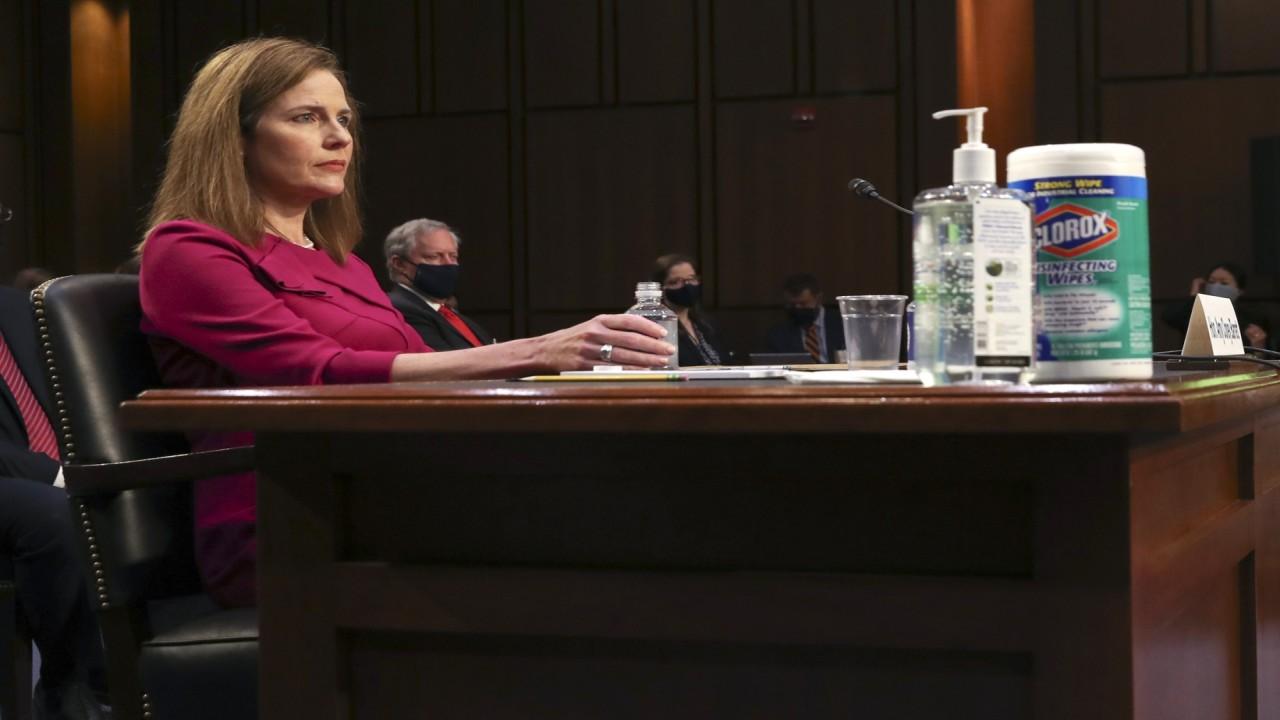Dems warn Barrett confirmation means doom for ObamaCare, but 'severability' doctrine might save it
The demise of ObamaCare may be far less likely than Democrats say or Trump would like
Democrats, since Amy Coney Barrett was announced as the Supreme Court nominee, have hammered the message that if she is confirmed she could be the deciding vote in California v. Texas, a constitutional challenge to the Affordable Care Act (ACA) being pushed by red states who say the individual mandate in the law is unconstitutional.
President Trump the day after he announced Barrett's nomination said he is rooting for the ACA, commonly known as ObamaCare, to be struck down.
"Obamacare will be replaced with a MUCH better, and FAR cheaper, alternative if it is terminated in the Supreme Court. Would be a big WIN for the USA!" Trump tweeted.
DEMS FRAME AMY CONEY BARRETT AS THREAT TO OBAMACARE DURING CONFIRMATION HEARING
Barrett's pre-judicial writings were in fact critical of a 2011 case upholding the ACA's constitutionality by reading the individual mandate as a tax. But the demise of the may be far less likely than Democrats would have voters believe -- or as the president would like.
That's because of the "severability doctrine."
California v. Texas and the individual mandate
California v. Texas stems from a case brought by a coalition of red states saying the ACA is unconstitutional because the individual mandate that Americans buy health insurance is no longer associated with a financial penalty. In the 2011 case Barrett has been critical of, Chief Justice John Roberts upheld the ACA's constitutionality by reading the financial penalty associated with not buying health insurance as a tax rather than a fine. The move rankled conservatives who'd hoped to see former President Obama's signature legislative achievement fall.
But in 2017 Congress eliminated the financial penalty for not buying health insurance while leaving the actual provision that requires people to buy health insurance -- the individual mandate -- in place. This, the red states behind the legal challenge say, makes it an unconstitutional mandate to purchase a certain product, even if there is no enforcement mechanism. Congress cannot force people to buy insurance "any more than it can order them to buy a new car or broccoli," the red states say in a brief.
"The only reason that [the individual mandate] survived was because it was 'fairly possible' to read its minimum-essential-coverage mandate as the trigger for a tax," the brief continues. Because of Congress' 2017 action, however, that is no longer possible, the red states say.
SCHUMER SAYS DEMOCRATS WON'T GIVE GOP QUORUM TO ADVANCE BARRETT NOMINATION
Because four Republican-appointed justices dissented in the 2011 case, many reasonably conclude the court, in light of the new facts, is more likely to say the individual mandate is unconstitutional if Barrett is confirmed and the court has a 6-3 Republican-appointed majority,
Severability
But when a court finds one provision of a law unconstitutional, it will also analyze whether or not that part of the law is so central to its legislative purpose that the entire rest of the law must fall -- its severability.
At an earlier stage of this case, a federal district court judge concluded the individual mandate was not severable from the rest of the ACA. The judge's opinion concluded that "the absence of the [individual mandate] would undercut Federal regulation of the health insurance market" that relied on all Americans being insured.
An appeals court, however, said the district court's ruling on severability was "incomplete" and ordered it to go through the law with "a finer-toothed comb." That move was circumvented when the Supreme Court agreed to hear an appeal of the case by blue states who stepped in to defend the ACA in light of the Trump administration's decision to take a position against upholding the law.
TRUMP ADMINISTRATION TAKES AIM AT OBAMACARE IN SUPREME COURT BRIEF
The blue states, led by California, argue that the individual mandate sans the financial penalty is constitutional. But even if the Supreme Court finds that it is not, it should rule that it is severable and the rest of the law should stand, they say.
"The [Tax Cuts and Jobs Act] reduced to zero the amount of the alternative tax imposed by [the individual mandate]. That amendment 'declawed the coverage requirement without repealing any other part of the ACA,'" a brief for the blue states reads. "In other words, the statutory scheme currently in effect—which was adopted by both Houses of Congress and signed into law by the President—makes the minimum coverage provision effectively unenforceable while preserving the rest of the ACA."
The blue states add: "The statutory text thus gives us 'unusual insight into Congress’s thinking...' It manifests 'Congress’ intent that' the balance of the ACA 'should survive in the absence' of an enforceable minimum coverage provision."
The red states and the Trump administration dispute this and argue that the entire ACA should be overturned. But some experts say it's quite possible that at least some Republican-appointed justices -- perhaps even Barrett herself -- could side with the blue states on severability and leave almost all of the ACA, including its protections for people with preexisting conditions, in place.
"It is entirely unclear how Barrett would vote on the technical issue of severability," Jonathan Turley, a law professor at George Washington University, said Monday. "Other conservatives like Roberts and Kavanaugh are expected to vote in favor of severing the individual mandate from the rest of the ACA."
Jonathan Adler, a law professor at Case Western Reserve University Law School, advanced the same view in an article for Reason in May. That article cited a brief he and three other academics filed in California v. Texas arguing that no matter what the court concludes, the individual mandate should be severable.
CLICK HERE TO READ MORE ON FOX BUSINESS
"Under the settled approach to severability that this Court has followed consistently for more than 100 years, the question here is not debatable: the mandate is severable from the rest of the ACA," Adler and his co-authors wrote. "Any other conclusion would be a judicial usurpation of Congress’s lawmaking power."
The Supreme Court has yet to even hear oral arguments on California v. Texas, which are scheduled for Nov. 10, so there's been no indication from the sitting justices on how they would rule, as is often the case based on the questions asked during the oral argument sessions.
But the fate of the ACA and its insurance exchanges and protections for those with preexisting conditions -- even assuming Barrett is confirmed to the Supreme Court -- is far from sealed.
GET FOX BUSINESS ON THE GO BY CLICKING HERE






















